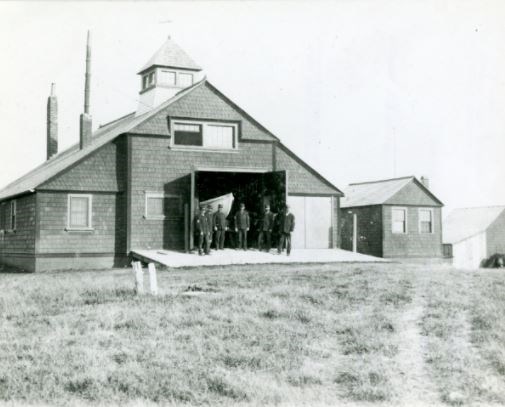Last updated: January 29, 2018
Article
The War Reaches Home: Attack on Cape Cod

United States Coast Guard
On July 21, 1918, New Englanders found themselves with World War I on their doorsteps in the form of a German U-boat attack off Cape Cod, at the town of Orleans. During the attack, some of the shells fired from the submarine landed on Nauset Beach, making this the first attack on the US mainland since the War of 1812 and the only attack on US soil during World War I.
The war affected Cape Cod even before the attack. Down the road in Chatham, a naval airbase and vessels from the Coast Guard Station patrolled the waters. The biggest change was increasing traffic in shipping lanes as American vessels carried ammunition, food and supplies to Europe. Traveling to Europe put American vessels in danger. Germany was determined to cut off American supplies to France and Britain and began using its newest weapon, the submarine (U-boat) to fire on any vessel in European waters. The attacks on unarmed merchant vessels, and the practice of sinking them without giving those onboard a chance to escape, was one of the major reasons why the US entered the war in 1917.
U-boats coming to the American east coast were given the task of attacking and destroying as many vessels as possible. On July 21, 1918, a U-boat targeted the tugboat Perth Amboy, under the command of Captain James Tapley, and the four barges she pulled behind her. Captain Tapley recalled that the fire was very erratic and the gunners seemed to be nervous. Twenty shells were fired at the tugboat, more than needed. Meanwhile, Robert Pierce, native of Cape Cod and keeper of Coast Guard Station No. 40 in Chatham, Orleans, got word of the attack. He ordered his surfmen into a lifeboat to rescue the people under attack. As he and his men were going into enemy fire, he called the Chatham Naval Air Station for help.
Eric Lingard answered Pierce’s call. A pilot at Chatham Naval Air Station, Lingard wanted to fight the Germans in the skies of France, but he was stationed in Chatham instead. On July 21, 1918, he took off in a HS-1L flying boat with two other pilots to help Pierce and those under attack. The attack subsided temporarily when Lingard’s plane arrived. His plane carried a Mark IV bomb that first failed to drop and then did not explode when it hit the water. As the plane circled back around, the U-boat stopped firing on the vessels in the water and trained its guns on the planes. However, the German vessel submerged out of sight instead. The boat stayed out of view and the airmen, thinking the enemy had left, returned to Chatham. After the plane had departed, the U-boat surfaced and resumed firing. Only when the tug was in flames did the U-156 finally submerge and leave the area.
Hundreds of onlookers had gathered to watch the attack. One bystander recalls, “We weren’t scared, we were mad!” Anti-German sentiments were already present throughout the country, but now the residents of Cape Cod began to think they were seeing Germans everywhere. Some even claimed Germans infiltrated the Chatham Naval Air Station and tampered with the bombs as an explanation on why the Mark IV failed to detonate.
